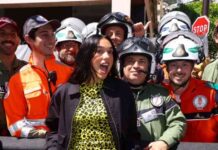It’s a warm August night in Santa Monica, and Kendrick Lamar is sitting on a low sofa in a hotel suite as the sun sets behind him, very carefully speaking to SZA and me. It’s more than a little surreal to have Lamar, the closest thing this era of hip-hop has to a truth teller, leaning forward and looking intently first into SZA’s face, then mine, saying things like “I do believe in love and war, and I believe they both need to exist.”
Lamar and SZA are, of course, two of the world’s biggest superstars, used to commanding stadiums full of fans. Lamar is the MC who many would argue keeps the soul of hip-hop alive. We are one year removed from the 50th anniversary of hip-hop, and the genre that once signified rebellion and artistic freedom has settled into its current iteration as the lingua franca of corporations and the American empire with barely a pang of conscience.
Amid all this, Lamar remains a rarity: a true artist interested in exploring the limits of self-expression and creativity. He makes personal records about regret, family trauma, and desire even as he consistently captures the zeitgeist. A dizzyingly fantastical lyricist, he has consistently challenged himself, first with his debut album, 2011’s Section.80, and continuing with good kid, m.A.A.d city. In 2018, he won a Pulitzer Prize for his album DAMN, the first time a work outside of classical or jazz traditions was honored. Early next year, he will be headlining Super Bowl LIX.
For this issue, only the fifth time this magazine has put a man alone on the cover, Lamar wanted SZA to interview him. It’s a move that makes sense when, later on, Lamar explains that he processes information best through connections with others. The two are former labelmates who toured together as they were coming up. In 2018, their song “All the Stars” was featured in Black Panther (Lamar also produced the soundtrack) and was later nominated for Grammy, Golden Globe, and Academy awards.
Lamar arrives first, in baggy knee-length chino board shorts, a yellow hoodie, and a fitted cap splashed with a slogan about the beach. He asks me a few polite questions about my trip to L.A., but I get the distinct feeling he isn’t the type to engage in small talk—a feeling confirmed when SZA herself arrives a few moments later in a cloud of perfume. She smells a bit like the incense booths on the corners in Harlem, but more luxurious, and she’s wearing a designer version of the stretch pants that inspired memes about sundress season versus fall season. She folds into a low velvet armchair, and before anyone else can speak, she turns to Lamar and says, “Are you mentally ill?” Lamar’s face lights up and he laughs.
“For what I DO, there is certainly no GROWTH without VULNERABILITY.”
So kicks off an hour-and-a-half conversation in which the artists talk about fear, spirituality, parenting, and creation. These are two creative supernovas, but in person, in this suite with burnt-orange walls, with the lamps turned so low that I can see the moonlight from outside the window reflecting off SZA’s high cheekbones, it becomes apparent that their star power derives less from stage tricks or media manipulations and more from the intensity of deeply curious, wildly magnetic personalities.
Lamar speaks in almost a hush, forcing SZA and me to lean closer to catch his words. SZA, in contrast, speaks in bubbling bursts that make Lamar laugh. At a certain point, as the summer air rolls through the open patio doors, the whole thing takes on the distinct vibe of a late-night ramble—the kind of free-flowing conversation you might overhear between two friends in the front seat of the car while you’re in the back, slightly stoned and cruising through the night.
SZA: We shot a movie last night. I’ve never shot a movie before, so I was freaking out. It’s a lot of being scared to be myself. I’m either gonna pretend it never happened or not show up to the premiere.
I met Katt Williams [on set]. He told me I was mentally ill, like, as a compliment. He was like, “Sa, I believe you might have some mental—”
And I was like, “Illness?” And he was like, “Yes.” He said, “Oh, welcome.”
I want to ask you about your mental health. Do you feel like you suffer from mental illness or experience it ever? Or do you just feel like you’re in a multitude of feelings and you’re not putting a label on it?
KENDRICK LAMAR: I grew up with that term. I was hearing it when I was five, six years old.
S: So you identify with it but not as it.
KL: My whole thing is, it’s all experience. I say some shit on a record and identify with a moment, and then I don’t identify with it anymore. That’s just growth for me. All that shit is subjective.
S: It’s giving self-therapy.
KL: I think it’s going back to my inner child, right? I was trying to understand myself, trying to find people I could relate to. How to identify myself outside myself. It sounds crazy to a lot of people. I really can see myself out of my body. When I do that, I have no judgment toward it. It’s too many eyes on me to not remove myself. That shit is scary to anybody else.
S: Are you scared?
KL: No, because I’ve learned that I can’t identify with my performances onstage. I can’t hold my true whole identity to that person who’s onstage. Because if I did, that means I will judge every movement every time I fuck up a lyric, every time I’m off-key. … It’s too much to deal with. So I have to have a distance between the performer and the person I close my eyes and look at the ceiling with. I had to develop that tough skin at like 16, 17 years old, not knowing it was not only for my career but for myself. It’s mentally ill for sure.
S: It’s very honest. Speaking of honesty and ego, have you done ayahuasca?
KL: I haven’t done it.
S: What? I wonder how you’re arriving at all of these conclusions. I want to talk to you about your spiritual practices. How many spiritual practices contribute to your day-to-day?
KL: All day, every day.
S: All day is ceremony?
KL: Ain’t no bullshit. Ain’t no cliché. But I literally talk to God. Like, it’s to a point where I’ll be starting to think I’m going crazy. But then He has to remind me, “No, this is really me.” My early-morning practice is that I have to run. When I started running, that’s where I started to understand. There was this threshold of pain in the spirituality for me. I remember my shins was aching and I was like, I got one mile to go. Then I get whispers and downloads and start talking about shit that I want to know about. And next thing I’m three miles in, four miles in. I wake up and do that shit every day.
S: Loss of self … you have to break yourself.
KL: I have to.
S: I’m grateful for the God tea. Sidebar, what do you feel like your top three contributing factors to self-transformation in the last few years have been?
KL: The power of honesty and being honest with myself, perspective about the person sitting across from me, and learning that vulnerability is not a weakness. That last one probably been one I’m still developing.
“I feel my WORK in MUSIC is just the START. I don’t think it’s my END GOAL. I know it’s NOT my END GOAL. MUSIC is just a VESSEL to get me THERE.”
S: Which one is the hardest?
KL: The last one.
S: Why?
KL: We talk about our childhood. I hate going back to that. It’s traumatizing. My pops, he was tough. He was militant, as far as every day you are expected to go to work, take care of your family, get back up to do it all over again. Being-a-man type shit, right? And he never showed no weakness. He never showed any emotion that could garner a one-up from the person sitting across from him. And I learned to experience that, not knowing I had them same traits, right?
But for what I do, there is certainly no growth without vulnerability. If I understood the power of vulnerability earlier, I could have had more depth and more reach to the guys that was around me in the neighborhood coming up.
You know, our parents, they never had these outlets to express themselves the way they wanted to. I’ve always looked at us as somewhat of a beacon of hope [for them]. I always wanted to know, how does your mom feel about your self-expression?
S: You know, my mom grew up dark-skinned in the ’50s. My mom integrated schools in St. Louis. She made herself smaller to be polite and nonproblematic Audrey. And growing up in the burbs where we were one of the few Black families, she kind of passed that to me. She’s developed this delightful energy that she really, truly does have. But also I feel like deep down, she really needs to beat some ass and she’ll feel better.
When she told me about how she spends so much time monitoring herself … people be like, “Oh yeah, we are our ancestors’ wildest dreams” when you talking about “It’s time to vote.”
But I’m my ancestors’ wildest dream because I can be a bitch and I’m okay with that. Because my mom wasn’t allowed to be a bitch in her space or in white spaces. And I feel like that’s my duty to literally get in here and be like, “I’m gonna do what I want.”
And I feel like my mom at first was really uncomfortable with me saying crass things and behaving in a certain way. And she was embarrassed, even though she was proud. And then something happened where it started to free her.
She started moving things around in the house, designing the house, and being free. She didn’t grow up with money or anything. So it’s so scary for her to think about renovating a crib or having something for herself. She never even imagined what her dream house could be. So it’s like it scared her. It fucked her up. She was upset and embarrassed, but now she’s, like, freed-by-proxy type shit.
KL: You gave her that.
S: And she gave it to me. When was the last time you cried? When was the first time you cried?
KL: I would say the last time I cried was probably on Mr. Morale [2022’s Mr. Morale & the Big Steppers] on the “Mother I Sober” record. That shit was deep for me.
S: Would you say you’ve done more crying recently than you have in your life?
KL: Now? Yeah, I have to.
S: It’s cleansing.
“I don’t BELIEVE I’m an ANGRY PERSON. But I DO believe in LOVE and WAR, and I believe they BOTH NEED to EXIST.”
KL: It might be easier for you, though.
S: I cry all the time. I’m gonna cry right now because that is just beautiful. Wait, you didn’t tell me, what was the first time that you allowed it to happen?
KL: The first time I allowed it to happen is documented, actually, onstage [in 2011] when Dre and Snoop and the whole West Coast was out, and they was like, “This is the torch that we were handing off.” Dre passed me the torch, and a burst of energy just came out and I had to let it flow.
My tears is all on the internet. And now I look back and I love that moment. I love that that happened. Because it showed me in real time expressing myself and seeing all the work that I put forth actually come to life in that moment.
S: That was emotional and pretty. What do you want for yourself now? What’s your driving force? Do you feel like you’ve done it all? Do you feel like now it’s all for the plot? Is the plot you? Is further self-discovery the plot? Is it domination?
KL: It’s funny. I was asking myself that this morning. I get fulfilled sharing my experiences with the youth and allowing them to hear these stories and hear these experiences and catch up to them. So to actually answer your question, it’s communication just with people in general. And I feel my work in music is just the start. I don’t think it’s my end goal. I know it’s not my end goal. Music is just a vessel to get me there.
S: Do you have an idea of what you’re supposed to do?
KL: I don’t. I’m curious, and that’s what keeps me energized.
S: Do you even have a desire specifically of what it should be, or are you gonna let God shape it for you?
KL: I’m gonna let God shape it. I love the mystery of it. I have to have it. I have to. The chase of it all. You know what I’m saying?
S: You’re so teachable.
KL: [Laughing] Shut up.
S: You are. That’s what I feel like I suffer from. I’m not teachable for real. That’s my problem, because I always be like either in my fear or do some shit. I have a low pain tolerance but a high competition tolerance. I can’t explain it. What is it that you want the most, if you want for anything?
KL: Information. I want it all. I want the resources. I wanna meet people smarter than me. I wanna talk to them. I want them to show me things. I just wanna be fulfilled with whatever this world has to offer. That shit hypes me up. Information. I’m a motherfucking nerd for it. You is too.
S: I am.
KL: This shit is a mystery, and I love it as a mystery. I love it. I love that the answers could be wrong or right.
S: You have such Father Time energy. It’s very universal-dad vibes. Actually, it’s more universal sensei. It’s almost gender ambiguous. It’s father and mother because you actually seem quite in tune with your feminine energy. Do you consider yourself in touch with your feminine side?
KL: I have to balance both. At first, all I knew was the masculinity, and I always kept that wall up because of my pops.
But the more I delve deeper into my music and the more expressive I get with myself … that is the feminine energy right there. That’s not the bravado that I grew up seeing all the time. This is who I am, the soft-spoken me, and I have to own it.
This is where my superpower lies. Because if my job is to communicate, I need to be able to communicate with everyone. I need to be able to sit in front of SZA and talk to you in a way where you feel comfortable, in a way where it feels authentic from me to you, you to me, and I can’t do that with a wall up. I can’t do that with my full masculinity.
S: Can I ask you a hypermasculine question? You can also tell me to shut the fuck up. What does “Not Like Us” mean to you?
KL: [Laughing] Not like us? Not like us is the energy of who I am, the type of man I represent. Now, if you identify with the man that I represent …
S: Break the man down for me.
KL: This man has morals, he has values, he believes in something, he stands on something. He’s not pandering.
He’s a man who can recognize his mistakes and not be afraid to share the mistakes and can dig deep down into fear-based ideologies or experiences to be able to express them without feeling like he’s less of a man.
If I’m thinking of “Not Like Us,” I’m thinking of me and whoever identifies with that.
S: Now, can I say something else in that realm, or you want me to get away from that? Can I ask you something else?
KL: Is it mean?
S: Nooooo! It’s more so like, I thought it was really interesting that there was any consensus at all that you might be an angry individual. For me, I don’t find that any energy that comes from you comes from an angry place. And actually, the last hour and change pretty much solidifies that it’s almost from a yogic, monklike place. So when you feel the surge of energy in records like that, where is that root? Is it anger?
KL: I don’t believe I’m an angry person. But I do believe in love and war, and I believe they both need to exist. And my awareness of that allows me to react to things but not identify with them as who I am. Just allowing them to exist and allowing them to flow through me. That’s what I believe.
S: I’m gonna quit while I’m ahead, before I say something crazy. “I wanna MEET people SMARTER than ME. I wanna TALK to THEM. I want them to SHOW ME things. I just wanna be FULFILLED with whatever this WORLD has to OFFER.”
KL: Okay. Now let me see what’s going on with you, man. What I’ve always loved about you and respected about you is your ability to fully express yourself. How have you been able to navigate that through your music? Do you dread it coming out through certain lyrics?
S: I wrote a song last summer that was too honest, and I couldn’t put it out. I just be telling on myself so crazy and I can’t stop. It’s like I have to tell on myself so I’m not bored. Because otherwise, I’m just like, what’s the point?
When I’m in the studio, it hurts too much sometimes. Maybe that’s why I tap in and pretend to be other people. That’s why I’m pretending to be you or pretending to be Frank [Ocean] or pretending to be Future, because it’s easy. It’s easier to be me through their eyes than it is to sit with some of the really harsh things that I say about myself to myself. I guess I want to say nicer things about myself. So I’m like, I guess I shouldn’t look through my eyes. I should look through somebody else’s.
But when I heard Mr. Morale, I was like, “I’m not digging [deep enough in my art]. I’m running from so many things.” So now I’m in my bag, I’m like, “Okay, I’m codependent. I’m a people pleaser. I’m afraid of all these things. I’m so fucking selfish.” All these things I tell myself because I have to, to strip the ego from the bottom. I have to because I’m bored to death with this iteration of myself.
Why am I trying to not be human so bad? Because it hurts so damn bad. But that is the job. No matter how many spirits you talk to or any of that. It just doesn’t matter. You have to be here. You










